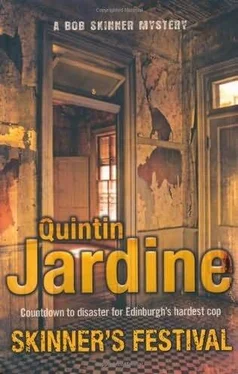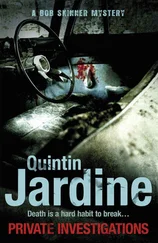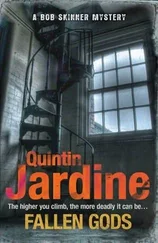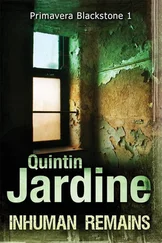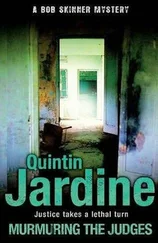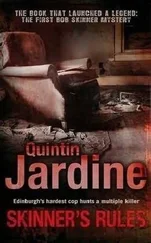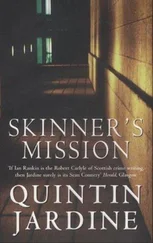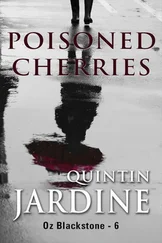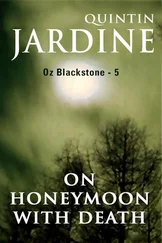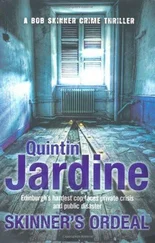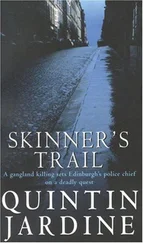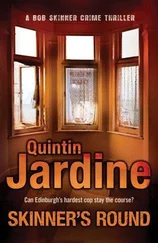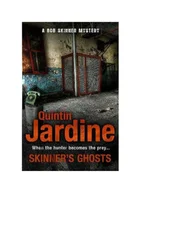Quintin Jardine - Skinner's festival
Здесь есть возможность читать онлайн «Quintin Jardine - Skinner's festival» весь текст электронной книги совершенно бесплатно (целиком полную версию без сокращений). В некоторых случаях можно слушать аудио, скачать через торрент в формате fb2 и присутствует краткое содержание. Жанр: Полицейский детектив, на английском языке. Описание произведения, (предисловие) а так же отзывы посетителей доступны на портале библиотеки ЛибКат.
- Название:Skinner's festival
- Автор:
- Жанр:
- Год:неизвестен
- ISBN:нет данных
- Рейтинг книги:4 / 5. Голосов: 1
-
Избранное:Добавить в избранное
- Отзывы:
-
Ваша оценка:
- 80
- 1
- 2
- 3
- 4
- 5
Skinner's festival: краткое содержание, описание и аннотация
Предлагаем к чтению аннотацию, описание, краткое содержание или предисловие (зависит от того, что написал сам автор книги «Skinner's festival»). Если вы не нашли необходимую информацию о книге — напишите в комментариях, мы постараемся отыскать её.
Skinner's festival — читать онлайн бесплатно полную книгу (весь текст) целиком
Ниже представлен текст книги, разбитый по страницам. Система сохранения места последней прочитанной страницы, позволяет с удобством читать онлайн бесплатно книгу «Skinner's festival», без необходимости каждый раз заново искать на чём Вы остановились. Поставьте закладку, и сможете в любой момент перейти на страницу, на которой закончили чтение.
Интервал:
Закладка:
The DCC had taken a few steps into the chamber, before he realised what lay on the floor. He started back in horror, but Skinner held tight to his elbow and drew him onwards.
McGuinness's ruddy face had gone grey.
"They can be hellish, these crime scenes, can't they, Eddie. I'm glad you're here to take charge of this one. I'll be in my other office if you need me.' He slapped the DCC on the back in friendly fashion, then turned and strode out of the marquee, his grim smile broadening with every step.
3
Skinner's 'other office' was a small room in St Andrews House, the headquarters of government in Scotland.
Three months before, out of the blue, he had received a telephone call from Alan Ballantyne, then newly appointed as Secretary of State for Scotland. The surprising thing, he had thought as he answered that summons to a private meeting, was that Ballantyne had placed the call himself, rather than arranging an appointment through his Private Secretary. The unorthodoxy of this approach had soon been explained. A suave politician, Ballantyne was still a few years short of forty, and his rise to power had been meteoric. It had been helped along by a lack of alternative talent among his party's Scottish membership, but nonetheless, even with that dearth of competition, his appointment to the Cabinet had been greeted with some surprise on both sides of the Commons Chamber. Ballantyne was a stocky man, with quick darting eyes and a quiff of frizzy hair which, however expertly it was cut, invariably stood up from the rest in defiance of gravity, giving the appearance of a permanent overhanging question-mark.
At their first meeting in his office, the new Secretary of State had received the detective alone.
'Sorry about the mystery, Mr Skinner, but I'm finding that, as in your own job, there are one or two matters in mine which can't be delegated, or even discussed over the telephone. I find myself with a… shall we say a personnel problem. You will find many advisers to the Secretary of State listed in those office directories over there. But there is one who is not listed among the rest. I think you are aware of the job I'm talking about, and I believe that you're acquainted with the previous post-holder.'
He had paused then, palms laid flat on the polished mahogany surface of his desk, and had thrown Skinner a sidelong glance which he still recalled vividly. Then he continued. 'Indeed, I believe that you may even have had something to do with the man's rapid departure from office.'
Skinner had said nothing, nor given anything away in his expression.
'If that's the case, Mr Skinner, you yourself have left me with something of a problem. So the way I see it, now it's up to you to solve it. Therefore, with the approval of your Chief Constable, I am inviting you to combine your present role within the police force with that of security adviser to the Secretary of State, in succession to Mr Hugh Fulton.'
At Ballantyne's suggestion. Skinner had called Jimmy Proud to discuss the offer there and then, and had found his chief enthusiastic.
'It's an honour. Bob, and it'll be the first time that job's been combined with active service in a police force. There's all sorts of ways it could help you here. Of course I think you should take it.
Who do you think put your name up anyway? Mind you, combining the two jobs was my idea. There's no way I'd want to lose you from here, I'm not that bloody patriotic.'
And so Skinner had accepted – with one proviso. 'I don't want any more of this secrecy crap. It's well outdated. Hughie Fulton used it only to build up a wall of mystique around him – to suit his ego. So, if I take the job, I go into the directories, along with the doctors, the dentists, the social workers and all your other advisers.'
'If you say so,' the Secretary of State had conceded, 'but remember the confidentiality is most of all for your own protection.'
Skinner had laughed. 'Listen, Mr Ballantyne. I make enemies enough just by being head of Edinburgh CID. A few more won't bother me.'
And so he had accepted the appointment. In the ensuing weeks he had seen a lot of the Secretary of State, their meetings usually in private. Their relationship was informal and cordial, yet Skinner, despite his long experience of appraising people, still felt that he knew very little of the real man. This Secretary of State was an enigmatic, secretive character, and though Skinner had sought to pinpoint the special quality which had won Ballantyne his high office, it remained hidden to him.
Skinner had experienced no problems in coping with the extra workload of his part-time post. Most of it involved nothing more strenuous than writing reports to the Secretary of State on an assortment of questions relating to his personal security and that of his junior Ministers, or to the security of establishments which were the responsibility of government, directly or through its agencies. He had taken the precaution of following some of his own security advice, varying his daily routine rather more often than before, garaging his car when possible, and checking underneath it whenever it had been left in a public place for any length of time. But overall, his new job, which carried a modest additional salary, had made his life no more difficult than before.
However, it had given him, as a serving policeman, one very big advantage. As Hugh Fulton had been before him. Skinner was now regarded as an active member of the UK Security Service. As such, he had access to the latest files on terrorism at national and international level, intelligence far more sensitive than any available to Andy Martin's Special Branch network. For example, Skinner was briefed fully on the Ulster Unionist plot, foiled earlier that summer, to assassinate President Clinton in New York, and on the secret elimination by the SAS, only a month before, of an underground organisation in Hong Kong which had been planning violent public opposition to the forthcoming Chinese takeover.
He had been told of the rigorous international search for the ringleaders in each case, and of the harsh orders to be carried out should any of them be traced in Britain. He knew the true operational strength of the various Northern Irish paramilitary groups, and was aware of the routes which were used to smuggle weapons and explosives to the British mainland. He had heard rumours, too, of the summary justice meted out to those terrorists who, by chance, fell into the hands of the SAS rather than the police.
But he knew of nothing at all, on either the MI5 or the Special Branch networks, which offered the faintest clue to the identity of the perpetrators of the Waverley Centre explosion.
4
Much of the information held by MI5 is stored on computer.
Skinner had access to it through a modem and a dedicated 'secure' telephone line. Seated before his terminal in his St Andrews House office, he gained entry to the network by keying in his personal code, a five-letter password known only to him, which was made up of his parents' initials.
The colour screen lit up, to be filled rapidly by a directory. One by one. Skinner selected all of the most recent intelligence files, then others which had any bearing on UK security or UK nationals, or which attempted to predict future trends in terrorism. He found a forecast of renewed Irish activity on the mainland in late September through early October, with a flash that a 'major event' was planned for the week of the Conservative Party Conference. There was a warning of possible trouble within the Chinese community in the wake of the recent Hong Kong incident. Another file reported that a senior government Minister had become a major security risk because of an active homosexual relationship with a military attache from a North African embassy. There was a warning posted of the possibility of further Basque nationalist activity against British tourists arriving on flights into Malaga and Alicante airports. But there was nothing – nothing at all – to suggest the likelihood of terrorist attacks in Scotland.
Читать дальшеИнтервал:
Закладка:
Похожие книги на «Skinner's festival»
Представляем Вашему вниманию похожие книги на «Skinner's festival» списком для выбора. Мы отобрали схожую по названию и смыслу литературу в надежде предоставить читателям больше вариантов отыскать новые, интересные, ещё непрочитанные произведения.
Обсуждение, отзывы о книге «Skinner's festival» и просто собственные мнения читателей. Оставьте ваши комментарии, напишите, что Вы думаете о произведении, его смысле или главных героях. Укажите что конкретно понравилось, а что нет, и почему Вы так считаете.
